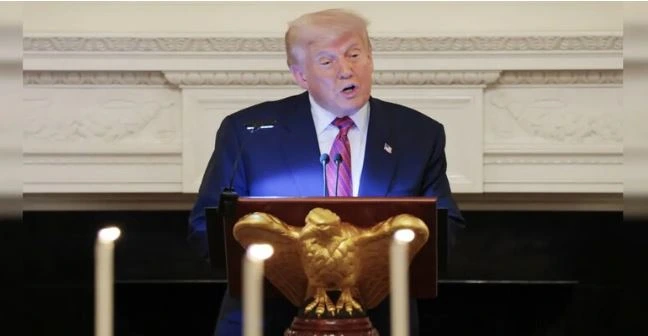Mexico and Canada also retaliate with additional tariff on US imports
The trade tariff war initiated by US President Donald Trump with Canada, Mexico, EU and China has been escalating. Trump has given his approval to put tariffs on $50 billion of Chinese exports while EU has endorsed a plan to impose import duties on $3.3 bn worth of US products on Thursday.
CNN, quoting a source with knowledge of the situation has reported that President’s approval for US to put on $50 bn of Chinese exports came after a meeting Thursday with top economic officials, including Treasury Secretary Steven Munchin, Commence Secretary Wilbur Ross and US Trade Representative Robert Lighthizer. The announcement is expected on Friday.
The report says that the move represents a serious escalation of trade tensions between the world’s two largest economies — just as Trump has also picked fights with allies Canada, Mexico and the European Union over steel and aluminum.
It was first reported by Bloomberg.
Read More: Who needs enemy whey you have friends like Trump: EU Chief
Earlier Beijing said it would respond to US tariffs on $50 billion worth of Chinese exports with retaliatory tariffs on $50 billion of US products such as cars, planes and soybeans.
Meanwhile, AFP, quoting a European Commission source reports, that EU countries on Thursday endorsed a plan to impose import duties on $3.3 bn worth of US products in response to US tariffs on steel and aluminum imports from Canada, the EU and Mexico.
 The source said, “Member states have today unanimously supported the commission’s plan for the adoption of rebalancing measures on the US tariffs,” adding that they would be implemented “in coming days.” The retaliatory tariffs against US’ painful duties should be in place by late June or early July, the report said.
The source said, “Member states have today unanimously supported the commission’s plan for the adoption of rebalancing measures on the US tariffs,” adding that they would be implemented “in coming days.” The retaliatory tariffs against US’ painful duties should be in place by late June or early July, the report said.
Read More: Trade war erupts; China slaps heavy duty on US products
Similarly Canada and Mexico have also announced their intention of taking counter measures against US imposed tariffs. Mexico has announced to impose tariffs on US imports including pork bellies, apples, grapes, cheeses and flat steels, among other products.
Canada has promised retaliatory tariffs worth $12.8bn on US products including steel, aluminum, whiskey and orange juice.
The ties among US and its European allies have been at their lowest level due to rows over a host of issues including trade tariffs, the Paris climate agreement, the Iran nuclear deal and the US Jerusalem move- recognizing it as Israel’s capital and moving its embassy to the holy city which was earlier promised to become capital of Palestine.
For months, Trump has slow-walked threats of tariffs against China as punishment for intellectual property theft. Initially he announced that US would impose trade penalties on about $50 billion of Chinese goods in March saying, “We have a tremendous intellectual property theft problem. It’s going to make us a much stronger, much richer nation.”
After China warned it would retaliate, Trump threatened tariffs on a further $100 billion of Chinese products. However, in mid-May, both announced a ceasefire after two rounds of trade negotiations.
They said in a joint statement that China would “significantly increase” purchases of US agricultural and energy products to reduce the trade imbalance, a top Trump administration demand. The US Treasury Secretary Steven Munchin subsequently declared the trade war “on hold.”
Ten days later, White House abruptly said it would proceed with the tariffs, along with new limits on Chinese investments in the US. Washington said it would finalize the list of goods that would be subject to 25% tariffs by June 15, and that the tariffs would go into effect “shortly thereafter.”
A further round of trade talks in Beijing earlier this month failed to yield any breakthroughs. On Thursday, Chinese Foreign Ministry spokesman Geng Shuang reiterated that China would not honor its pledge to increase purchases of US goods if tariffs were imposed.
After the G7 summit, held in Quebec, Canada last week, Trump sent out a couple of tweets in which he slammed Canadian Prime Minister Justin Trudeau as “very dishonest & weak,” and ordered US representatives not to sign a joint communiqué with the G7 leaders.


 India News15 hours ago
India News15 hours ago
 Cricket news15 hours ago
Cricket news15 hours ago
 India News14 hours ago
India News14 hours ago
 Latest world news1 hour ago
Latest world news1 hour ago
 Latest world news2 hours ago
Latest world news2 hours ago
 India News1 hour ago
India News1 hour ago
 Latest world news1 hour ago
Latest world news1 hour ago










